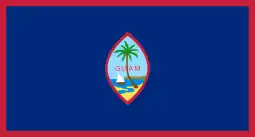William Edwin Safford
William Edwin Safford (December 14, 1859, Chillicothe, Ohio – January 10, 1926) was an American botanist, ethnologist, and educator employed by the U.S. Navy and federal government.
Safford graduated from the U.S. Naval Academy in 1880 and pursued advanced studies at Yale and Harvard. He served in the Spanish–American War. In 1899 he was appointed deputy to the naval governor of Guam, Richard P. Leary. In practice, however, Leary delegated day-to-day administrative and judicial duties to Safford, indicating his preference to directly govern only in emergency situations.
While stationed on Guam, Safford compiled a thorough survey of the plants of economic importance to be found on the island. The resulting volume, published as The Useful Plants of the Island of Guam (Contributions from the United States National Herbarium Vol. IX), remains of interest not only as a pioneering work of ethnobotany but also for its insights into the natural history and folkways of the island. He also wrote a monograph on the Chamorro language of Guam.
After Leary's term ended in 1900, Safford left the Navy and joined the U.S. Department of Agriculture as assistant botanist. In 1920 he achieved a Ph.D. from George Washington University. He suffered a stroke in 1924 but remained active until his death.
Sixteen plant species are named for Safford in honor of his contributions to botany.
Bibliography
- The Chamorro Language of the Island of Guam (1905)
- Useful Plants of the Island of Guam (1905) (Reissue 2009, Guamology Publishing)
- Cactaceae of Northeastern and Central Mexico (1909)
- Edible Plants and Textiles of Ancient America (1916)
- Natural History of Paradise Key and the Nearby Everglades of Florida (1919)
- Notes on the Genus Dahlia, with Descriptions of New Species (1919)
- Synopsis of the Genus Datura (1921)
- Daturas of the Old World and New (1922)
- Ant Acacias and Acacia Ants of Mexico and Central America (1923)
References
- "William Edwin Safford" (Hunt Institute for Botanical Documentation, Carnegie Mellon University)
- "William Edwin Safford" (Washington Biologists' Field Club)
